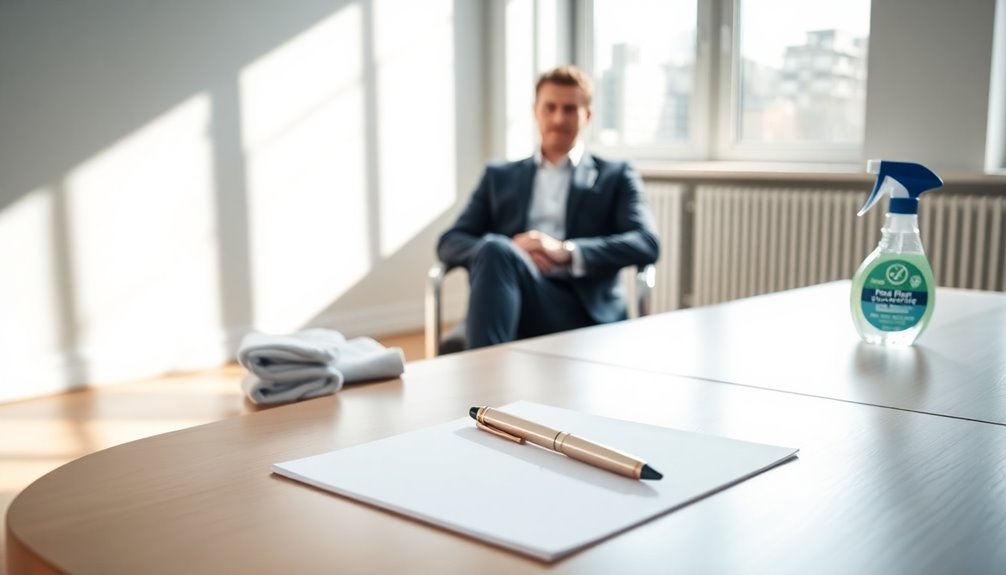When you're faced with the choice of being the first or last candidate in an interview, remember that both come with psychological effects. Being first can set the bar high due to primacy bias, while going last might leave a fresh impression thanks to recency bias. However, decision fatigue could impact evaluations of later candidates. To maximize your chances, contemplate consistent evaluation criteria and solid preparation that showcases your fit. Think about scheduling too—opting for midweek or favorable times can enhance your performance. There's much more to contemplate that could shape your interview experience effectively.
Key Takeaways
- First candidates may create high standards, influencing perceptions of those interviewed later due to primacy bias.
- Last candidates benefit from recency bias, as their performance is fresh in the interviewers' minds.
- Decision fatigue can impair evaluations of candidates interviewed later, affecting overall fairness.
- Consistent evaluation criteria are essential to mitigate biases related to interview order.
- Scheduling interviews midweek in optimal time slots can help reduce stress and improve candidate performance.
The Psychology of Interview Order

The order in which candidates are interviewed can greatly impact hiring decisions, creating a psychological ripple effect throughout the process.
When you're the first candidate, you set the bar high, establishing standards that later candidates endeavor to meet. This primacy bias makes your memorable impression resonate longer.
Conversely, if you're the last candidate, you might benefit from recency bias, where hiring managers remember you best due to your recent interview. However, don't underestimate the effect of decision fatigue; by the time they meet you, they might be overwhelmed.
The quality of the other candidates interviewed that day also influences how you're perceived, reminding you that the interview sequence can shape evaluations considerably.
Evaluating Candidates Effectively

Evaluating candidates effectively requires a structured approach that minimizes biases and maximizes fairness. By implementing consistent evaluation criteria, you can guarantee that each candidate is assessed on the same metrics. This method enhances objectivity and provides a clearer comparison.
| Evaluation Criteria | Candidate A | Candidate B |
|---|---|---|
| Communication Skills | 8/10 | 7/10 |
| Technical Skills | 9/10 | 6/10 |
| Cultural Fit | 7/10 | 8/10 |
| Overall Impression | 8/10 | 7/10 |
Utilizing a table like this helps visualize strengths and weaknesses. Additionally, encourage team feedback post-interview to further refine your evaluations, guaranteeing a thorough perspective on each candidate's potential fit within your organization. Incorporating best practices in software quality assurance can also enhance your evaluation process by ensuring that candidates possess the necessary skills and traits for success.
Best Practices for Scheduling

When scheduling interviews, it's essential to take into account both the candidates' and hiring managers' availability to guarantee a smooth process.
Aim for midweek days, like Tuesday to Thursday, as they typically offer lower stress levels. Schedule interviews during ideal times, such as late morning or early afternoon, when focus and energy are at their peak.
Keep interview lengths in mind: aim for 45 to 90 minutes based on the role. Also, consider potential time zone differences if you're interviewing remote candidates.
Finally, confirm all details in advance and provide reminders to everyone involved. This approach helps foster a positive atmosphere and guarantees candidates feel valued throughout the hiring process. Additionally, fostering positive environments can significantly enhance the overall interview experience for both candidates and interviewers.
Essential Preparation Tips

Preparing for an interview can feel like gearing up for a big game, and having the right strategies can make all the difference. Start by researching the company's culture and values; this knowledge helps you tailor your responses.
Choose your attire carefully—dressing appropriately shows you respect the opportunity. Practice common interview questions and think about your answers to demonstrate your skills confidently.
Don't forget to prepare insightful questions to ask the interviewer; this shows your genuine interest in the role.
Finally, gather essential items like extra copies of your resume, certifications, and a portfolio. Being well-prepared not only boosts your confidence but also makes a lasting impression on your potential employer.
Timing Your Arrival

Arriving on time for your interview is just as important as the preparation you've done. Aim to get there about 15 minutes early; this not only shows respect for the hiring manager's time but also gives you a moment to collect your thoughts. Too early, though, can be disruptive.
| Arrival Timing | Impact |
|---|---|
| 15 minutes early | Positive first impression |
| On time | Shows punctuality but lacks preparation |
| 15 minutes late | Creates a negative impression |
Importance of Follow-Up

Follow-up after your interview is essential for making a lasting impression. A well-crafted thank-you email or handwritten note shows your appreciation for the interviewer's time and reinforces your interest in the position.
It's your chance to highlight key points from your conversation, reminding them of your qualifications and fit for the role. This simple gesture can set you apart from other candidates who might skip this step.
Additionally, following up demonstrates professionalism and enthusiasm, qualities that employers value. Aim to send your follow-up within 24 hours of the interview to guarantee you're fresh in their minds.
Strategies for Success

Success in interviews hinges on a combination of preparation and strategy. Start by researching the company's culture and values, tailoring your responses to align with them.
Practice common interview questions, ensuring you articulate your experiences clearly. Prepare thoughtful questions to ask the interviewer; this shows your interest and engagement.
Arrive 15 minutes early to compose yourself and make a good impression. If you're the first candidate, focus on setting a positive tone. If you're last, leverage insights gained from earlier interviews to enhance your responses.
Additionally, adopting an MVP (Minimum Viable Product) approach can help you refine your interview strategy based on feedback from previous interviews.
After the interview, send a thank-you email within 24 hours, referencing specific topics discussed. This reinforces your enthusiasm and keeps you fresh in the interviewer's mind, regardless of your position in the lineup.
Frequently Asked Questions
How Can I Stand Out as the First or Last Candidate?
To stand out as a candidate, focus on showcasing your unique skills and experiences during the interview.
Prepare insightful questions that demonstrate your knowledge of the company and industry. Use specific examples from your background to highlight your achievements.
Be confident and personable, making a memorable connection with the interviewer.
Finally, follow up with a thank-you note that references key points discussed, reinforcing your enthusiasm for the role and leaving a lasting impression.
What Should I Do if I Feel Nervous During the Interview?
If you feel nervous during the interview, take a deep breath and remind yourself that it's normal to feel this way.
Focus on your strengths and the preparation you've done. Maintain eye contact and actively listen to the interviewer's questions.
If you need a moment, it's okay to pause before answering. Practicing common questions beforehand can also help boost your confidence.
How Can I Research the Interviewer Beforehand?
Did you know that about 70% of hiring managers appreciate candidates who've done their homework?
To research your interviewer, start by checking LinkedIn for their background and interests. Look at their recent posts or articles to understand their perspectives.
If you can, find common connections or shared experiences that might spark conversation. This preparation not only shows your initiative but also helps you build rapport and tailor your responses during the interview.
What Types of Questions Should I Avoid Asking?
When preparing for your interview, avoid asking questions that reflect poorly on your interest or knowledge.
Steer clear of inquiries about salary and benefits too early, as it may seem you're more focused on compensation than the role itself.
Don't ask about vacation days or perks right away; instead, focus on the company's culture and growth opportunities.
Finally, avoid negative questions about past employees or the interview process, which can raise concerns.
How Do I Handle Unexpected Interview Questions?
Think of unexpected interview questions as curveballs in a baseball game. When they come your way, stay calm and focused.
Take a moment to breathe, and don't rush into your response; it's okay to pause. If you need time to think, say so.
Use your experience to frame your answer, and relate it back to the job. Remember, it's an opportunity to showcase your problem-solving skills and adaptability.
Conclusion
In the end, whether you're the first or last candidate, your success hinges on preparation and presence. Embrace the moment, focus on showcasing your strengths, and remember that timing is just one piece of the puzzle. Coincidence might bring you luck, but your dedication and confidence will leave a lasting impression. So, step into that interview with poise, and no matter your position in the lineup, make it count. Your future awaits, and it's yours to seize!









